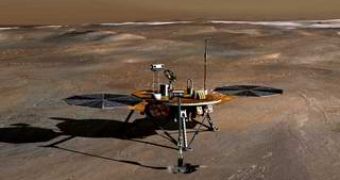The first investigation of the Phoenix Mars Lander on the Martian soil collected from its surroundings failed to detect any chemicals that may be essential to life at all, and although another seven single-use test ovens are expecting further analysis, the next experiment could just as well be the last one for the spacecraft. The problem, NASA researchers say, is that the short circuit suffered in the early days of the mission by the Thermal and Evolved Gas Analyzer may occur again in the next experiment, in which case the whole instrument could be broken.
"Since there is no way to assess the probability of another short circuit occurring, we are taking the most conservative approach and treating the next sample ... as possibly our last," said NASA mission chief scientist Peter Smith, University of Arizona.
The Phoenix Mars Lander reached the northern polar regions of the Red Planet on May 25th and immediately began the preparation of its instruments in anticipation for the three month mission during which it had to establish whether or not the chemicals essential to life are present in the Martian soil and if Mars could have ever been habitable. A couple of days later, the TEGA instrument experienced a short circuit at one of the heating elements that was eventually replaced by a redundant one.
About several days after this little incident, the robotic arm of the spacecraft delivered its first sample to the TEGA instrument. However, little or no soil succeeded in passing through the screen and entering the test chamber, although the device shaking the screen appeared to work just fine. Phoenix had once again hit a snag; the soil sample was too compact and could not pass through the screen no matter how much it was shaken.
A solution was later found in the form of breaking the soil into smaller bits before delivering it to the TEGA analyzer, albeit disappointment soon followed as no organic compounds were found during the test. Even more so, it now appears that the short circuit could have been cause by repeated shaking; therefore, further experiments could again trigger it.
Mission scientists say they will try to analyze another sample next week, but must first conduct additional testing back here on Earth to ensure that the water ice particles within the soil do not sublimate before entering the instrument. Until that, however, Phoenix is scheduled to make microscopic observations on particles collected from one of the dug trenches around it.

 14 DAY TRIAL //
14 DAY TRIAL //